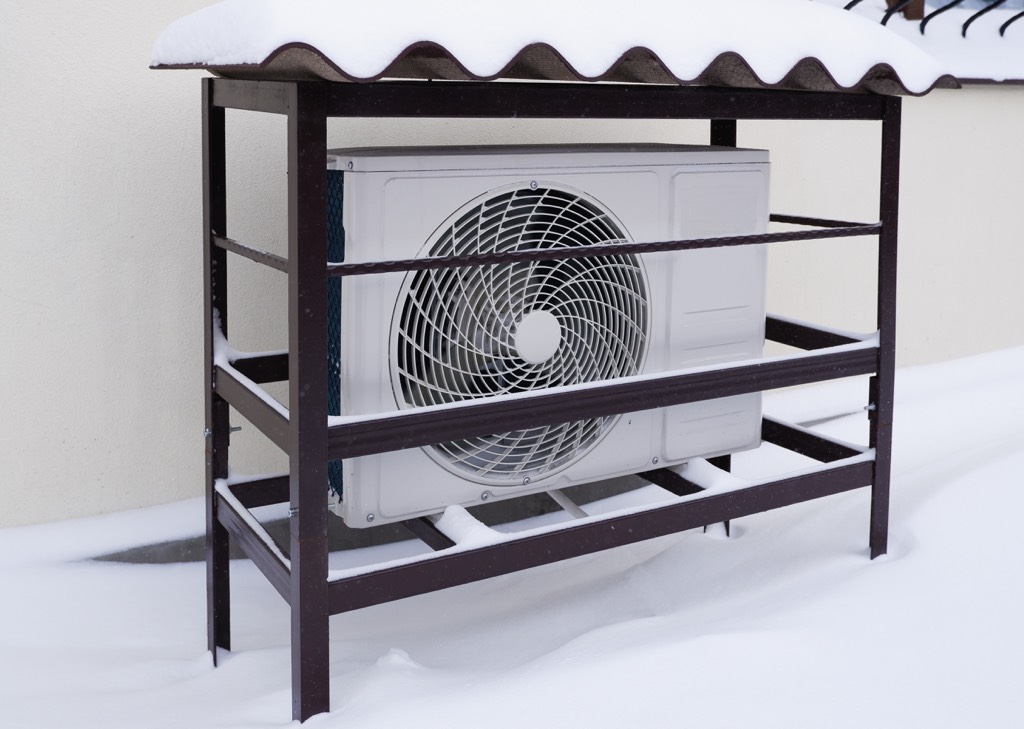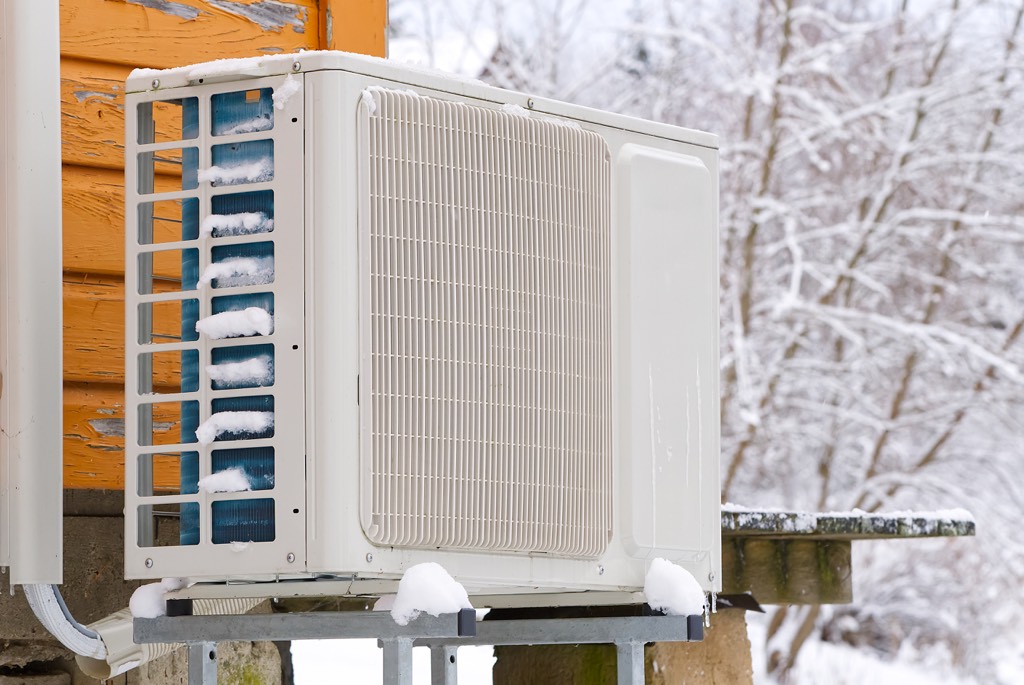Do air source heat pumps work in winter? The simple answer, is yes, they do! Most air source heat pumps can operate effectively in low temperatures, many of them down to -20°C to -25°C. If you live in a colder area of the UK, where you experience more frosts than average in wintertime, check with your installer on the recommended operating temperatures of different models. They can advise you on the different models, their lowest operating temperatures, and the best choice for your particular needs.
We explained how air source heat pumps worked in another article. They extract heat energy from the air outside and use it to provide internal heat for your home. This means they will work harder and become less efficient if the air outside is cooler. But even in cold weather, some heat energy remains in the air. Although heat pumps may work less efficiently, they are still more efficient than a gas boiler – and greener because they are not combusting fuel.
How does a heat pump work in winter?
Air source heat pumps use a fan to pass air over a coil containing a refrigerant. The low boiling point of the refrigerant extracts the heat from the air and rapidly gets hotter. As it’s heated, the refrigerant turns into a gas which is compressed causing its temperature to rise further. As it is circulated, the refrigerant transfers the heat created from outside your home to inside. Once the heat is used inside the house, the refrigerant becomes cool again, and the whole cycle is repeated.
Do heat pumps work in cold weather? Yes they do. But during the winter, when the air temperature is cooler outside, air source heat pumps have to work harder. This is also true of boiler systems. Because the air inside our homes is cooler in winter, traditional boilers also need to work harder and for longer periods of time.
One thing to bear in mind when asking do air source heat pumps work in the winter is that they cannot provide heat instantly, like a gas combi-boiler. They may need to extract heat energy from the air for longer. But as long as the temperatures remain within the spec for the heat pump, they will still provide the performance you need. They might need to use more electricity than at warmer times of the year. But, on the plus side, they don’t use gas (which is currently more expensive per kW), and you are not burning fossil fuel.
In addition, air source heat pumps generate an average of three times the amount of heat per kW of electricity than an average gas boiler. This rate will drop slightly in sub-zero temperatures. But even at colder temperatures, they will still generate twice the amount of heat per kW of electricity than a gas boiler.
Are air source heat pumps used in cold countries?
According to the UK Met Office, UK temperatures have gone lower than -25°C on just four occasions since records began. And these unusually low temperatures haven’t occurred since 1995. So most models should be suitable for operating in the UK.
In cold countries like Norway and Sweden, there is a heat pump in operation for roughly every four to five people. The winters in these countries are longer and deeper than the UK. In fact Norway produces almost 100% of its domestic electricity via renewable sources. So heat pumps installed in Norway are not only more efficient at heating the building, but they are also greener too. This may put things in perspective if you are concerned that your area of the UK is too cold.
By comparison, the UK has only one heat pump for every 242 people. The UK Government has indicated its commitment to deliver on its Net Zero Strategy. It will need to push greener, more efficient ways of heating our homes and diminish our reliance on fossil fuels.
Air source heat pump problems in winter
To answer the question “Do air source heat pumps work in winter?”, we need to take a look at the kind of problems that can occur. We can also look at what we can do to prevent them from happening.
Ice accumulation
One of the main difficulties with air source heat pumps in cold weather is that ice can form on the coils on outdoor mounted units. This happens as the moisture in the air freezes and collects. The heat pump defrost cycle counteracts this. It should start to operate automatically to prevent ice from accumulating throughout the system. However, when the defrost cycle is running the unit is effectively running backwards. It cannot provide indoor heat at the same time. And it will not be as efficient at keeping your home warm.
In the unlikely event that the auto-defrost does not activate, you should be able to start the process manually. If it still doesn’t work, then something could be wrong with the sensor. There could also be debris blocking the intake vents on the unit.

Debris
You might think that covering an outdoor unit will help to protect it from frost, snow, and ice. Unfortunately this is not the answer. The whole idea of a heat pump is to extract air from the space around it. You should not cover it, unless it’s with the correct heat pump guard or enclosure. These are specifically designed so they don’t interfere with the air flow.
If you try to improvise something yourself, you may cover the intake and either impede or prevent the unit from extracting air. Debris such as dust, leaves or snow may cover the intake and prevent the unit from working efficiently. Or they may be drawn into the heat pump which can cause damage. It is important to check the area around the heat pump (roughly 60 cm on all sides) regularly, to make sure that air can circulate freely.
To answer the question “Do air source heat pumps work in winter?” remember that most units are designed to work in colder temperatures than the usual UK winter. So it is perfectly normal for them to be covered in ice and snow at some point during colder weather. This will not affect the internal workings of the unit. If the compressor should freeze, the best remedy is to call an engineer -just as you would if you had a problem with your gas boiler or frozen pipes.
Refrigerant
The refrigerant is recycled around the heat pump as it collects heat energy from the air outside and converts it to warm air or hot water inside. It is not consumed by the unit and it should not deplete. If the level of refrigerant has reduced over time, this indicates that there is a leak inside the system. You should call an engineer. Leaving it may result in a system break down.
There are a few signs you can look out for if you think your system may be leaking. If you can hear a ‘hissing’ noise, this is an indicator of a serious leak, and you should call an engineer immediately. Another indicator is very high electricity bills. This is a sign that your heat pump is not working efficiently. A third indicator of a leak is when the air blown from the heat pump is not warm. It is very unlikely that your heat pump will leak. But it is worth checking regularly to make sure everything is working as it should be.
Prevention
Of course, one of the best ways to ensure air source heat pumps work in winter is to look after them through regular maintenance and servicing, the same way you would look after a gas boiler. You can do some of this yourself. Clean the top of the condensing unit or indoor unit and perform a visual inspection every month to check that everything is working correctly. You can take pictures on your phone to compare and see whether anything has changed. If the air filters are dirty or damaged, you should replace them. You can call an engineer to do this job for you.
You should service your air source heat pump annually. A good time to get this done would be before the colder weather starts. That way you can make sure your air source heat pump works in winter, when you need it. A professional engineer will check the electrics as well as refrigerant levels. They will also look for evidence of leaks if the level has reduced. They will verify the whole system is working properly and double-check that no components need repairing or replacing. However, if during your monthly inspection you notice something has changed, for example:
- The heat pump is noisy
- There is an unexplained increase in electrical usage
- The refrigerant level as dropped
you should call an engineer immediately to check it out.
Upgrading your existing system for winter
In order to gain maximum efficiency and cost savings from your air source heat pump, think about installing larger radiators and underfloor heating. You could upgrade your insulation. This will ensure that all the heat produced to warm your home stays inside, and does not leak through the windows and walls.
In summary, do air source heat pumps work in winter?
An air source heat pump will heat your home and water effectively, even during the winter months. If you live in a particularly cold area of the UK, you may wish to look at a ground source heat pump instead of an air source system. It always makes sense to talk to a professional about other solutions that may be more suitable for your particular needs. For example, they may recommend installing a hybrid system. This uses both a heat pump and a boiler for when the weather is particularly cold.
Eventually, fossil fuels will run out. We may never reverse the damage they have done to our planet. We all need to think about the future and how we can heat our homes effectively, cheaply, and more sustainably.

